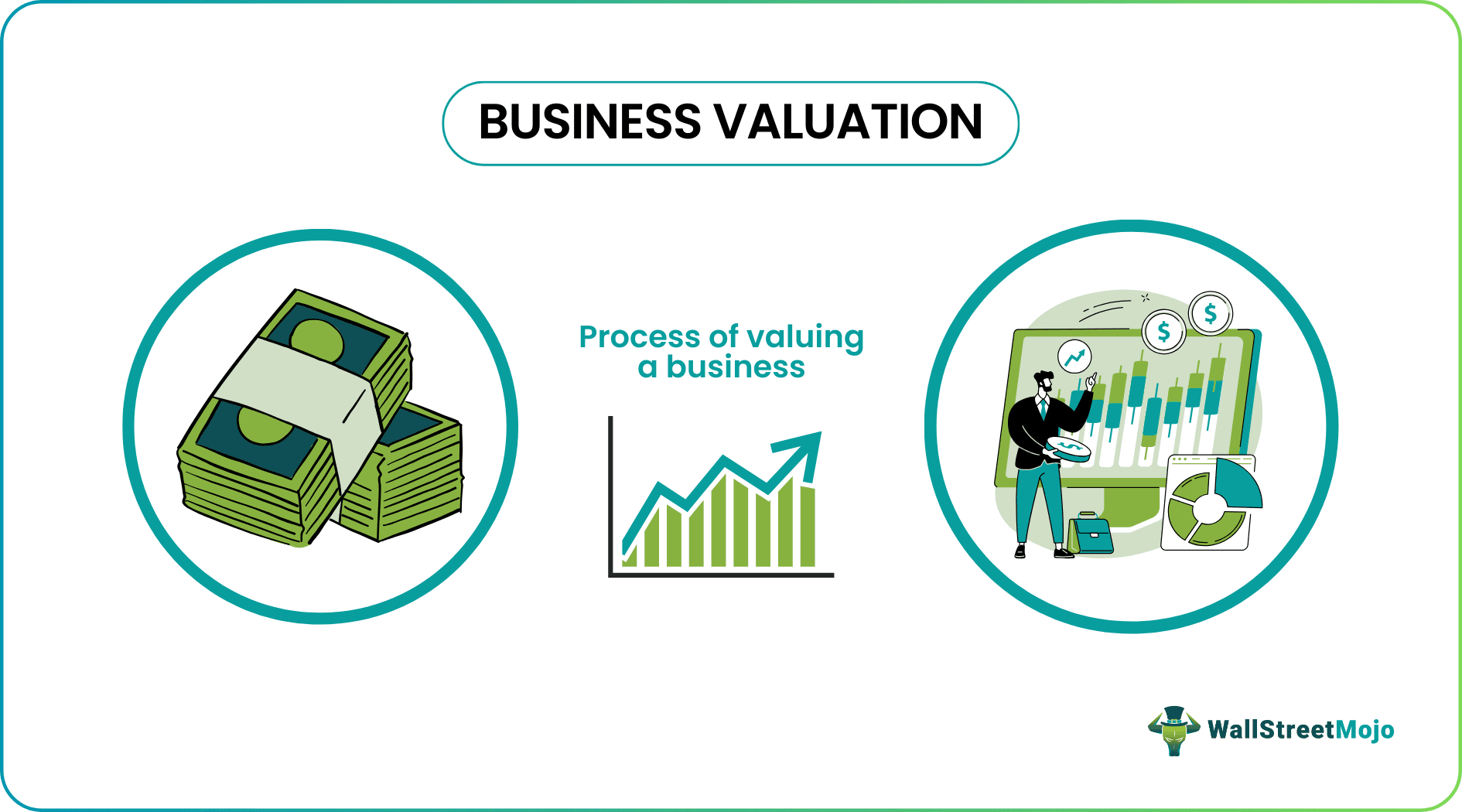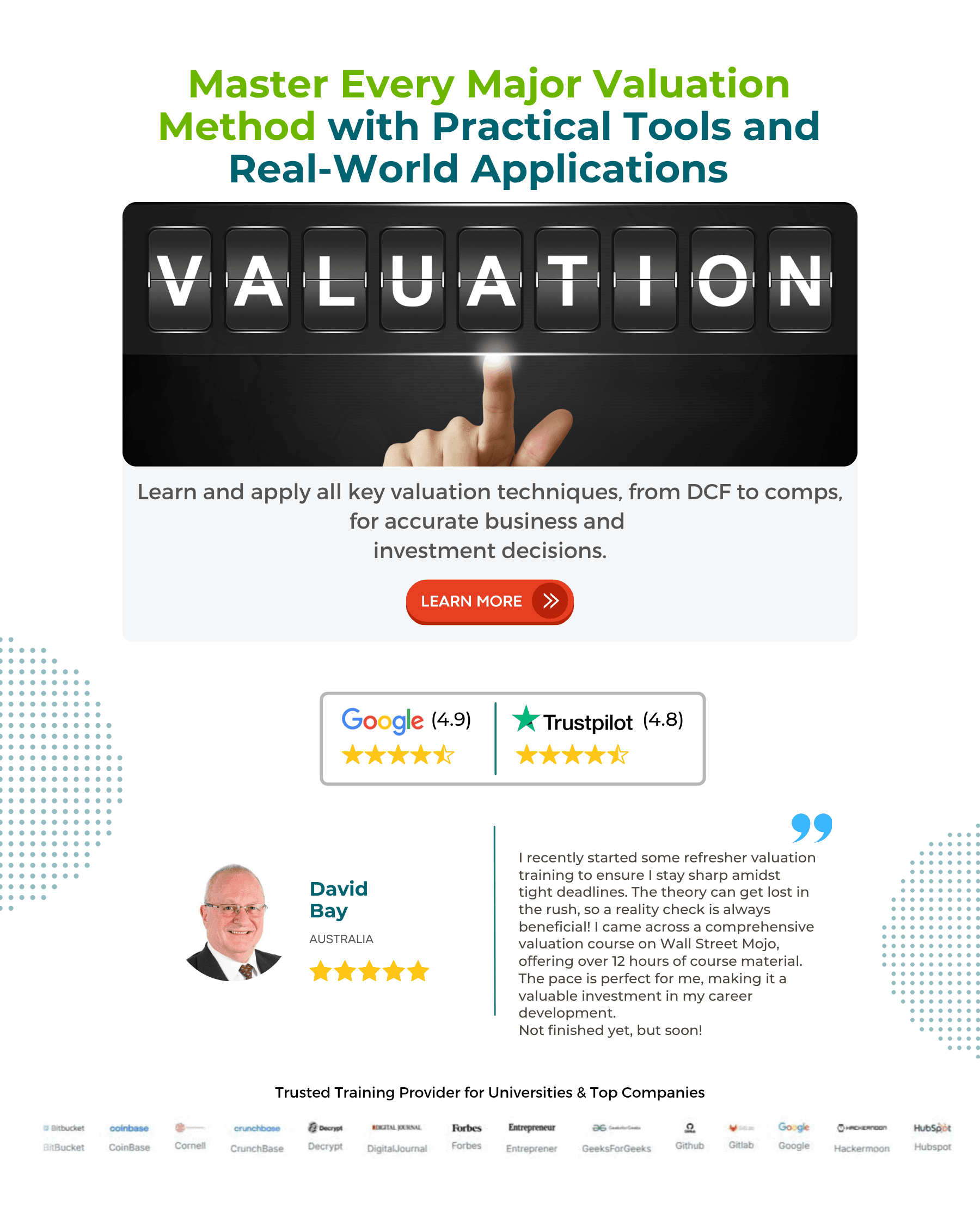Table Of Contents
What Is Business Valuation?
Business valuation refers to the process of assessing the economic value of a business. Examples of methods used to evaluate a business include book value, discounted cash flow, market capitalization, and EBITDA.

It indicates how the company is performing now and where it will be headed in the future. With the increase in corporate activities, values have occupied a central place. The valuation process enables the management to determine which areas need improvement to increase the value, which is a highly important aspect of valuation.
Key Takeaways
- Business valuation is the method of evaluating the economic value of a business.
- Its application helps businesses in effective decision-making and contributes to planning economic development.
- An example of the asset-based approach is the book value method, the income-based approach is discounted cash flow method, and the market-based approach is the mergers & acquisition method.
- One of the simple techniques used in the valuation process is market capitalization. It is the product of the current share price and the total number of shares outstanding.
Business Valuation Explained
The business valuation process of valuing a business is usually applied when an owner wants to sell his business or merge with another business. Nowadays, valuation is not an uncommon process in entities, whether a start-up or a large corporation, and has great importance in business formation, dispute resolutions, mergers, acquisitions, attaining credit from financial institutions, and tax planning. In addition, a business owner requires an accurate value to analyze potential growth and opportunity costs while planning for future expansion and eventual transition.
The valuation assignment must provide the framework and reason for the valuation. Business valuation uses standards of practice known as Business Valuation Standards (BVS). According to IRS valuation guidelines, successfully completing a valuation assignment includes defining the valuation issue, planning, identifying relevant factors, documenting specific information, and analyzing the relevant information.
While doing the valuation, the analyst or the professional considers the purpose and the underlying objectives of the valuation. The fundamental factors, such as the business background, products, services, sector-wise growth, and economic and political situations, are considered. A qualified professional may primarily analyze the company's financial statements, capital structure, transactions over the past years, industry ratios, and other quantitative and qualitative data.
The basic valuation process can involve the valuations of tangible assets and intangible assets. It helps companies in strategic planning and other managerial decision-making processes. The valuation technique is useful when mere estimates are not acceptable. In addition, the quantitative value obtained through the valuation process is a boon in many circumstances. For example, the quantitative number can strengthen the negotiation process while selling a company.
Methods
The following are the general methods of business valuation that can be applied for large or small business valuations.
- Income approach: The income-approach techniques are used to determine the value of a firm based on the revenue it is anticipated to produce in the future. In other words, the present value of a company's expected profits or cash flows determines its worth. One example is the discounted cash flow method.
- Asset approach: The method focuses on finding the firm's net asset value. Examples include book value, liquidation value, and adjusted net asset method.
- Market approach: The market methods assess value by contrasting the target firm with other businesses in the same sector, usually with a similar size. One example is the merger & acquisition method.
Formula
Market Capitalization is one of the easiest methods to calculate business valuation. It is the product of the current share price and the total number of shares outstanding.
The business valuation formula is derived through the market capitalization method:
Market Capitalization = Current market price per share x Total number of outstanding shares.
Business Valuation Example
XYZ Ltd. has 500,000 outstanding shares and a current share price of $ 500.00. Based on this information and with the help of the market capitalization method, the business value determination takes place:
The current market price of the share x Number of outstanding shares
= 500,000 x $ 500 = 250,000,000.00 or 250 million.
The value is 250 Million.
Importance
A business valuation provides entrepreneurs with several facts and data about the true worth or value of the company in terms of market competition and asset values. The numbers obtained through business valuation methods help the business owners determine how much to reinvest in the firm and at what value they should sell the business to make a profit. Additionally, it helps potential buyers or investors estimate consistent growth and revenue over the past years. Hence, business valuation becomes a vital tool to measure the value of the business for the future.

